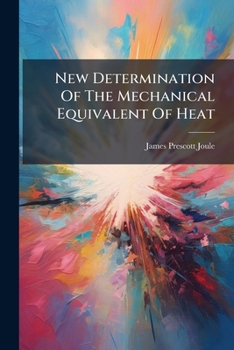New Determination Of The Mechanical Equivalent Of Heat
Select Format
Select Condition 
Book Overview
"New Determination Of The Mechanical Equivalent Of Heat" presents James Prescott Joule's groundbreaking research on the relationship between mechanical work and heat. This scientific paper details Joule's meticulous experiments to precisely measure the amount of work needed to produce a unit of heat, establishing a fundamental principle in thermodynamics. His work demonstrated the equivalence of mechanical energy and heat, laying the foundation for the first law of thermodynamics and revolutionizing our understanding of energy.
Joule's experiments, described in detail within this volume, are a cornerstone of modern physics and engineering. This publication is essential reading for anyone interested in the history of science, thermodynamics, and the development of energy conservation principles. Joule's legacy endures as a pivotal figure in the advancement of scientific knowledge.
This work has been selected by scholars as being culturally important, and is part of the knowledge base of civilization as we know it. This work was reproduced from the original artifact, and remains as true to the original work as possible. Therefore, you will see the original copyright references, library stamps (as most of these works have been housed in our most important libraries around the world), and other notations in the work.
This work is in the public domain in the United States of America, and possibly other nations. Within the United States, you may freely copy and distribute this work, as no entity (individual or corporate) has a copyright on the body of the work.
As a reproduction of a historical artifact, this work may contain missing or blurred pages, poor pictures, errant marks, etc. Scholars believe, and we concur, that this work is important enough to be preserved, reproduced, and made generally available to the public. We appreciate your support of the preservation process, and thank you for being an important part of keeping this knowledge alive and relevant.
Related Subjects
Engineering History Science Science & Math Science & Scientists Science & Technology Technology




